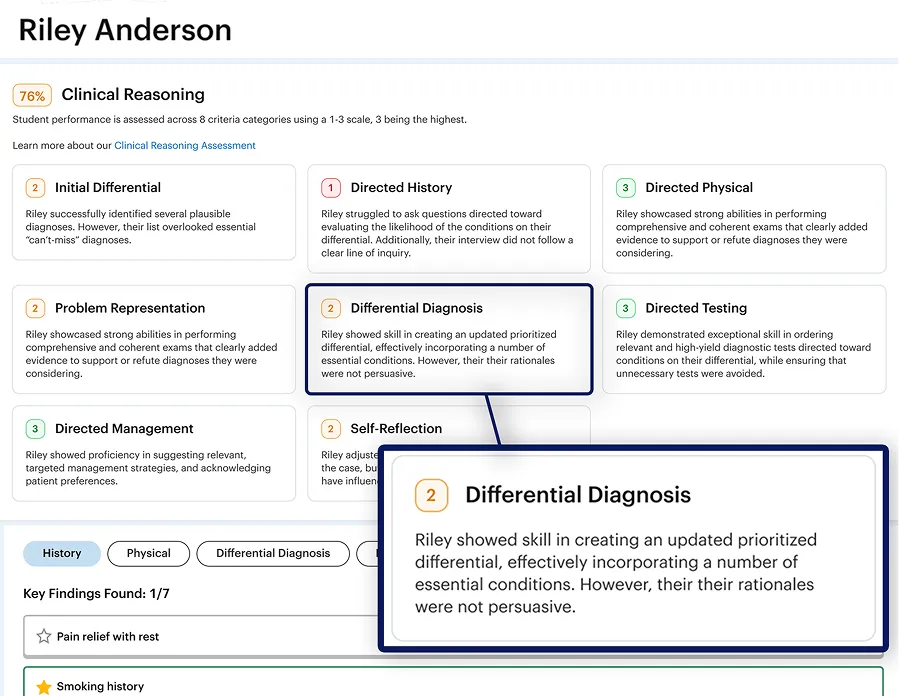



Advancing clinical readiness with AI-enhanced simulations and assessments
Medical education is evolving rapidly—and so is how we prepare students for clinical practice. At Sketchy, we pair expert-vetted AI, validated frameworks, and immersive simulation to create engaging experiences that mirror real-world clinical reasoning.
Start your free DDx trial

Our approach:
Where expertise meets intelligent technology
Our approach empowers educators to teach with confidence and equips students with a safe, reflective environment to practice and strengthen their reasoning skills—anchored in four guiding pillars.
Faculty-led design
Every DDx case and assessment is co-developed and reviewed by leading clinical educators and practicing physicians. This ensures that our simulations and evaluation rubrics align with authentic clinical expectations, institutional standards, and current evidence.
AI as a teaching partner
We view AI as an enhancement, not a replacement for educators. The technology supports faculty by automating structured assessment, analyzing reasoning patterns, and generating personalized learner feedback—all while keeping educators firmly in control of interpretation and guidance.
Built for the pace of modern medicine
Medicine evolves daily. So do our cases and models. DDx continuously integrates the latest guidelines, best practices, and diagnostic insights, ensuring learners practice in scenarios that reflect current realities and emerging standards of care.
Immersive, safe, and engaging
Learners engage in fully interactive clinical encounters—taking histories, performing virtual exams, ordering tests, and making management decisions. The platform tracks every step, enabling students to learn through hands-on practice—without patient risk or the time limits of rotations.
A structured framework for assessing clinical reasoning
At the heart of the DDx platform lies the Clinical Reasoning Assessment —a structured, evidence-based framework for evaluating how learners think through clinical problems. Developed in collaboration with expert clinician-educators, the Clinical Reasoning Assessment builds upon validated tools such as ART (Assessment of Reasoning Tool) and IDEA (Identifying, Developing, and Evaluating Arguments), while adapting them to the interactive, tech-enabled environment of DDx’s virtual patient platform.
Why assess clinical reasoning?
Clinical reasoning is the cognitive and metacognitive process by which clinicians:
- Gather and interpret patient data
- Generate and test diagnostic hypotheses
- Prioritize management plans
- Reflect on uncertainty and bias
Assessing clinical reasoning reveals how learners think, not just what they recall. It enables faculty to pinpoint reasoning gaps, tailor feedback, and ensure learners are ready to deliver safe, effective care.
Yet, despite its importance, clinical reasoning is rarely assessed systematically. Traditional evaluations—like oral presentations or written notes—focus on outputs rather than the thinking process itself. These approaches often rely on subjective judgment, vary across institutions, and lack opportunities for consistent feedback.
DDx’ Clinical Reasoning Assessment overcomes these challenges by offering:
- Consistent, structured evaluation across learners and cases
- Scalable, data-informed assessment that complements human judgment
- Real-time reasoning analytics without direct faculty observation
- Dynamic feedback to support continuous learning
 Start your free DDx trial
Start your free DDx trialHow the DDx Clinical Reasoning Assessment works
Embedded in every virtual case
The Clinical Reasoning Assessment is fully integrated into DDx’s AI-powered simulations. As learners navigate patient encounters, the platform evaluates their reasoning in real time.
Each reasoning behavior—how they gather information, interpret findings, form differentials, and make management decisions—maps directly to a domain of the Clinical Reasoning Assessment rubric, ensuring that performance is measured consistently and transparently across cases and cohorts.
Evidence-based rubric and standardized scoring
The Clinical Reasoning Assessment includes clearly defined performance anchors across key dimensions of diagnostic and management reasoning based on published frameworks like ART and IDEA.
Rubric dimensions are mapped to the ACGME, AACOM, and AAMC Foundational Competencies for Undergraduate Medical Education, providing alignment with nationally recognized standards.
Automated insights and reporting
Following each simulation, DDx provides automated performance summaries and targeted feedback to learners. Faculty can view individual progress or cohort-level data, identifying trends, tracking competency development, and pinpointing curricular areas for reinforcement—all without adding to faculty workload.
Built by and for medical educators
The Clinical Reasoning Assessment was co-created through the DDx Clinical Reasoning Summit, a collaboration among experienced faculty and clinician-educators from leading medical institutions. Together, we identified the essential elements of reasoning assessment and adapted them for scalable, tech-enabled use—reflecting both academic rigor and educational usability.
Meet our team
Our team is composed of experts, educators, and innovators passionate about elevating clinical reasoning through AI-enhanced learning.

Seth Polatino, DO
Internal Medicine Contributor

Myra Aquino, MD
Senior Content Strategist

Greg Young, MD
Internal Medicine Contributor

Andrew Berg, MD
Founder | Emergency Medicine Contributor

Lisa Jacobs, MD
Faculty Advisor

Hector Chapa, MD, FACOG
OBGYN Contributor

Elissa Naglieri, PA-C, DScPAS
Subject Matter Expert

Pooja Jethani, MD
Senior Content Strategist - AI

Taimur Dad, MD
Nephrology & IM Contributor

Saud Siddiqui, MD
Founder | Emergency Medicine Contributor
Let’s talk about bringing DDx to your program or institution
Whether you’re ready to explore a pilot, looking for full integration, or just have some questions, we’ll work with you to design the right approach for your institution.




















